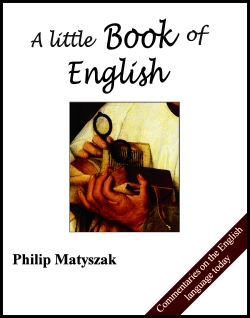|
The earlier Prof blog entries as well as some new articles are now available as a Kindle book from Amazon. We hope you enjoy it.

amazon.com amazon.co.uk
|
| 15 November 2025 | | Idiomatic Baseball | American TV shows are commonplace on screens far from their native country. However, these shows are designed primarily by Americans for Americans, and as a result some of the colloquialisms can be somewhat cryptic to foreign ears. This is particularly true of idioms from baseball which require some knowledge of the game to make sense.
For instance if our TV protagonist is 'thrown a curveball', this means that he has been presented with an unexpected challenge or unusual development – just as is a batter in a game when the pitcher throws him an unexpected delivery. Should the batter (or TV protagonist) fail to deal with the curveball, he might 'strike out', which in both cases is to try and fail completely.
If the person who struck out is forced to retire, someone else takes his place, or 'steps up to the plate'. This person may achieve the opposite of striking out, which is a 'home run'. This is how one scores points in the game and means to score a major success in everyday life – such as defeating the TV villain. Our hero might have achieved this success by 'playing hardball' which is a tough and uncompromising approach, or by going diplomatically about things in 'softball' style.
One should 'cover all the bases' (prepare for all eventualities) in case something 'comes out of left field' (occurs unexpectedly) and 'touch base' with all concerned. An inevitable delay might cause someone to take a 'rain check' which is what those who have paid to watch a game are given so that they can return later. One can also offer an approximate guess when that might be (a ballpark figure) or suggest that someone else's estimate is close enough to be 'in the ballpark'.
American teens also use baseball metaphors in their courting. A lad might only get as far as 'first base' (kissing and cuddling) before he strikes out. I leave it to the imagination of the reader as to what happens at 'third base'. | | | | | 15 September 2025 | | Fun with homonyms | English, they say, does not so much take words from other languages as take those languages into a dark alleyway and mug them. One result of this is that the same word can come from two different languages with the same pronunciation and spelling but with a completely different meaning. Here are some examples.
Consider 'bank'. This we got from the Vikings and it means a ridge, especially one at the side of a river. Because a 'banki' was a gentle slope it also came to refer to any sloping curve, such as that described by a plane when it 'banks'. However, in Latin (and modern Italian) a 'banco' is a bench, such as the one which money-changers sat on in the Roman forum, from which we get the name of the bank as a financial institution.
Old English met the Vikings again with 'batte' which means 'to flutter' (and is why butterflies have nothing to do with butter). This leads to the English 'bat' as in flying mouse, which has nothing do do with the wooden bat which comes from the Old English for 'club' or 'cudgel'.
Again the medieval Brits had the word 'grafen' meaning 'to dig out' – which is where we get 'engrave'. We also have 'grave', and being buried is a serious affair – or a grave one, from the Latin 'gravis' meaning 'heavy' or 'serious' – from which we also get 'gravity'.
Or the Old German 'foel' which is a tool, particularly for smoothing things – just as we do with a modern file. Not to be confused with the French 'file' which means a row or line, as when you file up for something. This word comes from the Latin 'filum' which was a thread (like 'filament'). Because these threads were used to tie bundles of documents, this gives us another 'file' as in 'filing cabinet' and the files on your computer.
So in English you can get people lining up for the documents relating to a smoothing tool. A file file file. It makes perfect sense. | | | | | 15 July 2025 | | Poppin' off with a blog entry |
I ain't gonna glaze you, your delulu if you think your rizz isn't dog water. Pretty ohio, tbh.
Welcome to Gen Alpha the generation that grew up with the internet hard-wired into their psyches. The result can be seen in their language use. For example if a teacher of parent is seen as going 'full npc' they are being bland, boring or robotic. That's because actual NPCs are often all three. They are the non-player characters in computer games. The ones that stand blankly by with a dog on a leash while you conduct a life-or-death virtual gunfight a few feet away. You can also have game-based 'main character energy, or even better, get 'aura points'.
And btw (by the way), txting has meant that Gen Alpha will speak in acronyms even when it's quicker to say the actual words. IMAO (in my arrogant opinion) that's pretty pointless, but meh. 'Meh' is something mediocre, not deserving of a strong opinion. It's a lot better than 'ohio' which is embarrassingly out of fashion or 'dog water' which is downright terrible.
Nice to see the Greek alphabet getting in there, with 'sigma' representing lone wolf coolness. Though if you try too hard to fake sigmat expect to be called out for 'aura farming'. I really like 'aura farming', as an expression, but wish they would get it right about their next Greek letter, 'beta'. To gen Alpha 'beta' is weak or boring. 'Her boyfriend is so beta'.
That's not what betas are, sociologically speaking. The beta is the one who acts as the alpha's sidekick always believing that they are next in line for the alpha slot. In fact if something happens to the first alpha another will step in – the beta will always be a beta. You could say the beta's dreams of social power are delulu – delusional.
Another one I love is 'glazing'. Glaze a cake and you pour liquid sugar over it. Overly praising someone who does not merit it is glazing. And tbh (to be honest) whether you think your rizz (charisma, especially with the opposite sex) is bussin it (superb) is up to you. | | | | | 15 May 2025 | | Of Dialect and Jargon | At first glance these two might seem approximately the same. Each differs from the standard form of the language, and is spoken by a small defined group of people. English has a wide variety of dialects. Even without leaving England one might have to translate between a Scouser, a Mancunian and a Cockney, since their particular uses of the language are pretty near mutually incomprehensible. Outside England, Jamaican, Appalachian and Indian (for example) offer their own colourful versions of the language.
Dialect is a subset of a language, in that the standard form should be comprehensible to speakers of even the more exotic flavours of that language. The other distinguishing point is that dialects tend to be geographic. For example, Scousers are from Liverpool, Mancunians from Manchester and Cockneys from London.
Rather than being confined to a particular region, jargon is specific to a particular profession or occupation. Jargon is also often incomprehensible to the outsider - and sometimes deliberately so. The obscurantism is a way for those in the know to let others know that they are part of the 'in' group, and sometimes also to make disparaging remarks about outsiders.
For example a computer tech might refer to a PEBKAC issue. This stands for 'problem exists between keyboard and chair' – in other words the user rather than the device. Medical types have been known to disparagingly refer to motorcyclists as IODs, since their disproportionately high casualty rate makes them involuntary organ donors. An American police force got into trouble through members referring to certain crimes – such as drug dealers shooting each other - as NHIs (no humans involved).
The military of course have extended jargon to almost a separate language. 'Sunray and the RSM yomped five clicks to the JOC with .223 SMGs to catch the cyclone 7.' Nor is this a modern phenomenon. In AD 69 the Roman historian Tacitus has a soldier referring to civilians as 'pagans', which before Christians hi-jacked the term was used by legionaries to mean 'outsiders not in the know.' | | | | | 15 March | | It means what it doesn't | There are a lot of things about the English language that infuriate those who study it as a second language. Irregular plurals for example. We have one house and two houses, but one mouse and two mice. And there's no rule to tell you which is a regular plural and which is not. Or pronunciation, because you can't tell how an English word is pronounced just by reading it. Few sane languages would pronounce a word like 'quay' as 'key'.
Irregular verbs are also an abomination but at least somewhat excusable – almost every language has them, including Latin which is otherwise remorselessly logical. However, one thing that really bugs some learners is that in English not only can the same usage mean different things, sometimes these different things are complete opposites. Consider the sentence 'After the women left the room, only the men were left.' Here we have the word 'left' meaning both 'departed' and 'remained'. Or if you say 'Fred is quite deaf' this can mean that Fred is totally deaf, or just a bit hard of hearing, because 'quite' can mean 'absolutely' or just 'somewhat'.
Then there's infinitives and present participles. Sometimes these can be used almost synonymously. As in these two sentences 'He likes swimming' and 'He likes to swim'. Okay, so the rule is that with sentences such as this one can use either construction and get the same meaning. Right? Wrong. Consider these two sentences. 'He stopped to think.' and 'He stopped thinking.' Here we have the same sentence construction with pronoun, verb and present participle or gerund, but this time the sentences have opposite meanings. English has to get around this by inserting a comma 'He stopped, thinking.'
It's not that native speakers know how to get around the problem. Mostly they don't realize that it exists. Point out these examples of contrary usages, and the average native speaker will say 'Oh, that's true. I never thought about that.' Some people yearn for something like the Académie Française, affectionately known as the French Language Police. But most just accept that English is a glorious, joyfully anarchic mess. Embrace the chaos!
| | | |
page 1 page 2 page 3 page 4 page 5 page 6 page 7 page 8 page 9 page 10 page 11 page 12 page 13 page 14 page 15 page 16 page 17 |
|
|

